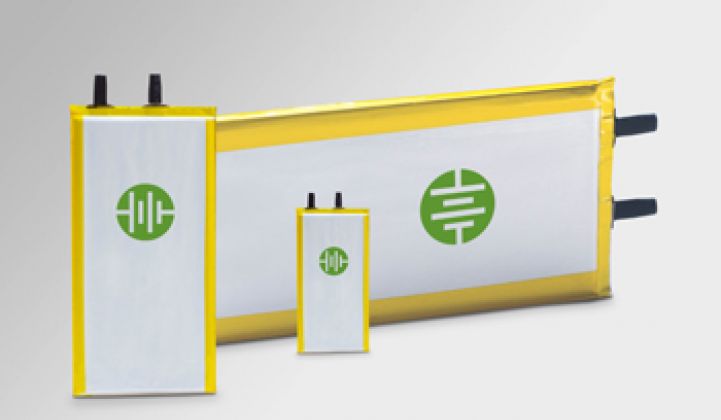Batteries are really just tiny canteens filled with a volatile chemical soup. Leyden Energy claims it can improve performance, reduce costs and boost safety by changing some of the basic ingredients.
The Fremont, California-based company produces lithium-ion batteries with an electrolyte based around a family of salts called IMIDE. Most other batteries use PF6-based electrolytes. While you probably don't know the difference between these chemical families, the difference to a lithium-ion battery is huge, claims CEO Aakar Patel.
The electrolyte -- a liquid that carries charges between the anode and cathode in a battery -- in standard batteries degrades the cathode over time. The chemical reactions caused by the electrolyte also cause gases to be emitted. These gases, which are contained inside of the battery canister, can cause as much as 80 pounds of pressure to build inside a battery.
Leyden's electrolyte doesn't have the same effect. It can also tolerate high temperatures. The electrolyte can be heated to 300 degrees Celsius. Conventional lithium-ion batteries experience degradation at 80 degrees Celsius, which forces battery makers to keep internal temperatures down in the 40 degrees Celsius range. Put another way, Leyden's batteries will have the performance of lithium cobalt batteries, the kind found in notebooks, with the safety levels found in lithium phosphate batteries.
"We can pack more active materials into a finite space," he said. "We reduce the gassing through a new salt."
The more inert, less volatile nature of the electrolyte will also allow Leyden to move from making cylindrical batteries with their characteristic hard case to polymer batteries, which are more like flexible sacks filled with chemicals. Polymer batteries give designers freedom to pack battery material into voids and other spaces inside their products. The battery pack can be designed around a car or another product: now, designers have to make sure their designs accommodate the shape of batteries.
Some of Leyden's technology comes from a technology license from DuPont, but the company has amplified those core patents with work of its own.
"For 20 years, nobody could make it work," he said.t
Will it work? Success will depend on reliability and lab testing. The company will have to compete against giants like LG Chem. Good luck. A123 Systems, the chronically-losing battery company, has proved how difficult that can be. So have Boston-Power and defunct Amara.
On the other hand, energy storage is one of the more welcoming markets for new concepts. Demand is high and it's hard to say which way the market will go. A group of startups -- Planar Energy, Sakti3, Prieto Battery -- and large companies such as Toyota have already started work on solid state batteries. In these batteries, the electrolyte is a solid, resulting in a more robust, longer-lasting battery that takes up far less volume and mass than a standard battery. But these are still in the experimental phase. Any of these companies, Leyden included, could ultimately get acquired.
Leyden has no plans to sell electrolytes to established manufacturers. Instead, it will design, produce and sell batteries. It has lined up three contract manufacturers and is already producing batteries. Lining up with contract managers cuts some of the capital costs. The first batteries will get sold into consumer markets. Dr. Battery in Canada announced that it will buy Leyden's cells for some of its replacement packs for notebooks and other products.
Over time, Leyden will try to get into EVs and grid storage.



